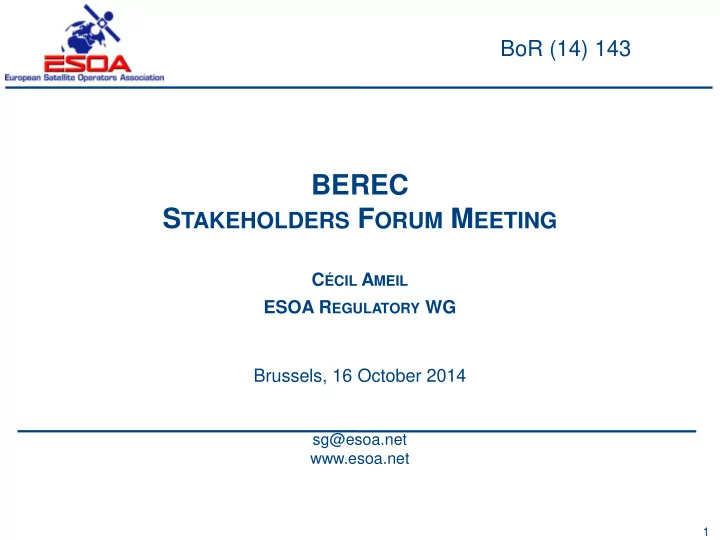

BoR (14) 143 BEREC S TAKEHOLDERS F ORUM M EETING C ÉCIL A MEIL ESOA R EGULATORY WG Brussels, 16 October 2014 sg@esoa.net www.esoa.net 1
ESOA Members Services Satellites 2
The Satellite Sector adds value for Europe Serving the EU: TV - Broadband - Disaster Management - Development – Aeronautics - Maritime Communications - Security - Energy Efficiency - Climate Change EU is the hub of the global satellite industry : Operators, launchers, manufacturers, insurance… Significant economic contribution : 2013 Booz&Co report identified direct & indirect contribution of 200,000 highly skilled jobs, € 10bn revenue with growth potential to € 100bn for EU economies Private investment today for the future : Euroconsult figures indicate approximately 200 GEO satellites are on global order to 2021 = almost $70bn of satellite operator investment alone ESOA members deliver value-added services : Oxford Economics found that satellite operators investments provide a massive multiplier in the downstream space sector Euroconsult found that every € 1 of public investment into satcoms generates € 47 of downstream turnover 3
Our views BEREC Strategic Priority 1: “ promote effective competition, and in so doing promote efficient investment and innovation in new and enhanced infrastructures and services” ESOA fully subscribes – investments and policy decisions should favour the most efficient services / solutions, e.g. broadcasting where appropriate, offloading when possible, connecting all citizens, ensuring resilience in M2M connectivity BEREC Strategic Priority 2: “ (high) minimum level of services and benefit from pan- European services wherever they are, to the extent possible” Satellite supports BB4All by access to pan-EU satellite services, same with NGNs, also expanding mobile comms to ships & airlines BEREC Strategic Priority 3: “ respond to ensure end- users’ continued ability to choose the services of their choice, at appropriate levels of price and quality” Satellite is a functional part of the mix of technologies (5G, ATAWADAC, hybrid platforms, BC-BB convergence) Overall objective: addressing the zettabyte challenge in the most cost & quality effective way! 4
Broadband – Broadcast Convergence Comparing technologies Making this new video experience available to all EU citizens requires distribution networks capable of enabling and supporting all required video-related features Broadband Technologies Broadcast Technologies No single technology ticks all boxes 5
Broadband – Broadcast Convergence A distribution challenge: Terrestrial Making this new video experience available to all EU consumers creates several challenges – the toughest being distribution, both from a cost and reach perspective An individualised HD-quality full OTT video consumption Ultra 35x requires 700 Gbytes per month /HH , HD 100x where EU’s current average consumption is ~20 Gbytes /HH 2.2TB / month 4x requires a sustainable peak-time 20Mbit/s access /HH, 10x where EU’s current observed average speed is 4.6Mbit/s 50Mbit/s 54% would hence theoretically only reach 54% HHs currently 20% passed for NGA, creating another divide Significant & costly upgrades would be required to go terrestrial only Sources: IDATE, Sandvine, Cisco VNI, Akamai, Analysis Mason, EC, SES 6
Broadband – broadcast convergence A distribution solution: Hybrid Reach Distribution Cost 1c/Gbyte CDN Deployment Cost Cumulated cost per receiver Cost per Gbyte NGA Roll-out < € 20 /GByte on satellite for Pan European 4Gbit/s any number of receivers broadcast satellite (each) EU Households Reach # Receivers NGA deployment cost going exponential Satellite to stream and push most popular Incremental satellite user cost unchanged content (video + others) to a “home –CDN” and an installed basis of 86 Mio Houses Terrestrial for interactivity, long tail and in EU time-critical access Joining forces to deliver a sustainable state-of-the-art experience 7
Satellite Broadband An Ongoing Revolution Drastic performance evolution in the last years thanks to multi-beams payload and frequency re-use technique: High Throughput Satellites (HTS) Operators decide whether to embark broadband specific payloads or to fully dedicate the satellite to broadband services (business plan). To Support EU Digital Agenda 2020 Objectives: Next generation HTS systems providing a significant improvement. Target: Terabit/s satellite capacity at viable – economical conditions in the 2020 2025 timeframe. 8
Recommend
More recommend